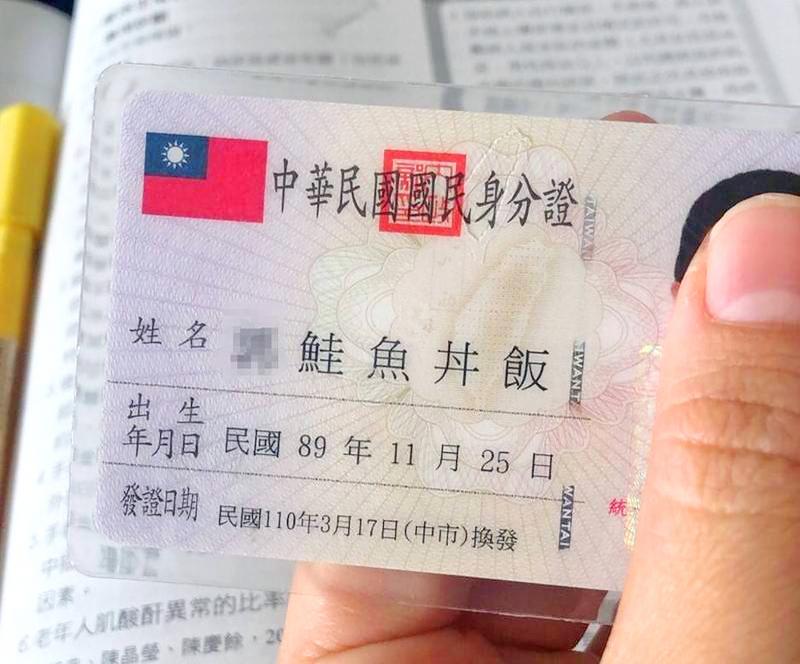Legislators on Thursday debated changing legal limits on name changes, after some of the hundreds of people who legally altered their name to “Salmon” in return for free sushi reportedly became stuck with it.
In March last year, restaurant chain Sushiro ran a promotion offering free all-you-can-eat sushi for a whole table to anyone with the Chinese characters for salmon, gui yu (鮭魚), in their name. In what was later dubbed “salmon chaos,” 331 people took part, paying a nominal administration fee to legally call themselves names including “Salmon Dream” and “Dancing Salmon.”
At the time the government was critical of the promotion, asking people to be “rational” and saying the stunt created pointless extra work for the paperwork-heavy bureaucracy.

Photo courtesy of a reader
Some participants built social media followings off the international media attention, while others ran small businesses taking friends to the restaurant for a fee.
Once the two-day promotion ended, most returned to their normal names, but more than one year on some have hit a roadblock — the government only allows people to change their names three times.
Legislators debated proposed amendments to the names ordinance to help those stuck as Salmons, or to prevent another “salmon chaos.”
“After the salmon chaos incident some people had already changed their name three times and now have no way to change them back,” New Power Party Legislator Chiu Hsien-chih (邱顯智) said, suggesting other measures including fee changes and cooling-off periods.
Some Democratic Progressive Party (DPP) and Chinese Nationalist Party (KMT) lawmakers called for it to be made more difficult.
“Our trust in civic rationality is too low,” DPP Legislator Kuan Bi-ling (管碧玲), opposing an increase to restrictions as an intrusion into people’s daily lives.
On social media people were scathing of the debate, saying adults should be more responsible, and that this was a waste of the legislature’s time.
“How can we amend the law for those who sell their personality for the sake of benefits?” one commenter said.
“Be responsible for your own life, Salmons!” another said.

INFRASTRUCTURE: Work on the second segment, from Kaohsiung to Pingtung, is expected to begin in 2028 and be completed by 2039, the railway bureau said Planned high-speed rail (HSR) extensions would blanket Taiwan proper in four 90-minute commute blocs to facilitate regional economic and livelihood integration, Railway Bureau Deputy Director-General Yang Cheng-chun (楊正君) said in an interview published yesterday. A project to extend the high-speed rail from Zuoying Station in Kaohsiung to Pingtung County’s Lioukuaicuo Township (六塊厝) is the first part of the bureau’s greater plan to expand rail coverage, he told the Liberty Times (sister paper of the Taipei Times). The bureau’s long-term plan is to build a loop to circle Taiwan proper that would consist of four sections running from Taipei to Hualien, Hualien to

A relatively large earthquake may strike within the next two weeks, following a magnitude 5.2 temblor that shook Taitung County this morning, the Central Weather Administration (CWA) said. An earthquake struck at 8:18am today 10.2km west of Taitung County Hall in Taitung City at a relatively shallow depth of 6.5km, CWA data showed. The largest intensity of 4 was felt in Taitung and Pingtung counties, which received an alert notice, while areas north of Taichung did not feel any shaking, the CWA said. The earthquake was the result of the collision between the Philippine Plate and the Eurasian Plate, the agency said, adding

Snow fell in the mountainous areas of northern, central and eastern Taiwan in the early hours of yesterday, as cold air currents moved south. In the northern municipality of Taoyuan, snow started falling at about 6am in Fusing District (復興), district head Su Tso-hsi (蘇佐璽) said. By 10am, Lalashan National Forest Recreation Area, as well as Hualing (華陵), Sanguang (三光) and Gaoyi (高義) boroughs had seen snowfall, Su said. In central Taiwan, Shei-Pa National Park in Miaoli County and Hehuanshan National Forest Recreation Area in Nantou County saw snowfall of 5cm and 6cm respectively, by 10am, staff at the parks said. It began snowing

The 2025 Kaohsiung Wonderland–Winter Amusement Park event has teamed up with the Japanese manga series Chiikawa this year for its opening at Love River Bay yesterday, attracting more than 10,000 visitors, the city government said. Following the success of the “2024 Kaohsiung Wonderland” collaboration with a giant inflatable yellow duck installation designed by Dutch artist Florentijn Hofman, this year the Kaohsiung Tourism Bureau collaborated with Chiikawa by Japanese illustrator Nagano to present two giant inflatable characters. Two inflatable floats — the main character, Chiikwa, a white bear-like creature with round ears, and Hachiware, a white cat with a blue-tipped tail